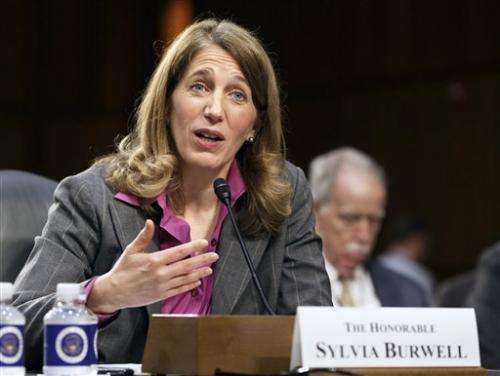Doctors face steep Medicaid cuts as fee boost ends

Primary care doctors caring for low-income patients will face steep fee cuts next year as a temporary program in President Barack Obama's health care law expires. That could squeeze access just when millions of new patients are gaining Medicaid coverage.
A study Wednesday from the nonpartisan Urban Institute estimated fee reductions will average about 40 percent nationwide. But they could reach 50 percent or more for primary care doctors in California, New York, New Jersey, and Illinois—big states that have all expanded Medicaid under the health law.
Meager pay for doctors has been a persistent problem for Medicaid, the safety-net health insurance program. Low-income people unable to find a family doctor instead flock to hospital emergency rooms, where treatment is more expensive and not usually focused on prevention.
To improve access for the poor, the health law increased Medicaid fees for frontline primary care doctors for two years, 2013 and 2014, with Washington paying the full cost. The goal was to bring rates up to what Medicare pays for similar services. But that boost expires Jan. 1, and efforts to secure even a temporary extension from Congress appear thwarted by the politically toxic debate over "Obamacare."
Doctors probably won't dump their current Medicaid patients, but they'll take a hard look at accepting new ones, said Dr. Robert Wergin, a practitioner in rural Milford, Neb., and president of the American Academy of Family Physicians.
"You are going to be paid less, so you are going to have to look at your practice and find ways to eke it out," Wergin said.
Medicaid covers more than 60 million people, making the federal-state program even larger than Medicare. The health care law has added about 9 million people to the Medicaid rolls, as 27 states have taken advantage of an option that extends coverage to many low-income adults.
Health and Human Services Secretary Sylvia M. Burwell says expanding Medicaid in the remaining 23 states is one of her top priorities. But the fee cut could make that an even harder sell, since it may reinforce a perception that the federal government creates expensive new benefits only to pass the bill to states. In Pennsylvania, where the Medicaid expansion will take effect Jan. 1, doctors are facing a 52 percent fee reduction, according to the Urban Institute study.
The fee boost has cost federal taxpayers at least $5.6 billion so far, but Stephen Zuckerman, one of the study's authors, said it's not clear whether access actually improved.
Many doctors did not begin to see the higher payments until the second half of 2013 because of rollout problems. And about three-fourths of Medicaid beneficiaries are in managed-care plans, which may already pay doctors more for routine care and prevention.
Still, Zuckerman said the fee increase was also passed through to doctors seeing patients through managed-care plans, and now they will feel the cuts. "The magnitude of the reduction will be somewhat smaller ... but there is no way to believe there won't be a decrease," he said.
Despite such questions, some states have recognized the importance of the fee increase. Fifteen are planning to use their own money to continue paying higher Medicaid fees through 2015, Zuckerman said. Among them are several Republican-led states that have resisted Obama's broader Medicaid expansion, including Mississippi and South Carolina.
Another dozen or so states are undecided.
"If you are cutting primary care fees, patients could end up in the emergency room for something that could be dealt with in a doctor's office," said Zuckerman. "That is not a good outcome."
Doctors groups say they will try to revive the Medicaid fee boost next year, when lawmakers must act to prevent a big cut in Medicare physician payments. The health program for seniors has much stronger political support.
More information: Urban Institute study, www.urban.org/publications/2000025.html
© 2014 The Associated Press. All rights reserved.















